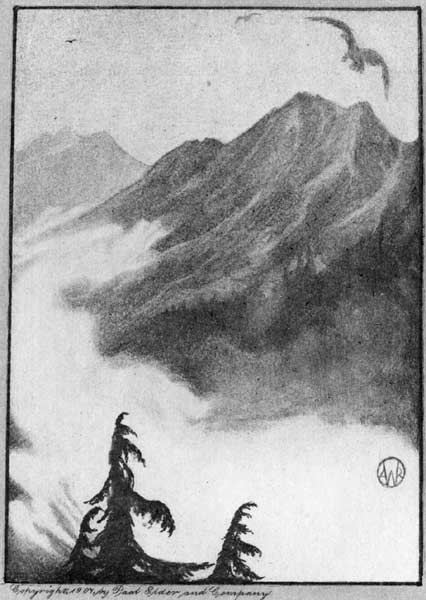| Home -> Paul Elder -> The Sea Fogs -> Introduction | |||
 |
|||
| Western Classics No. 1 The Sea Fogs A sheeted spectre white and tall, The cold mist climbs the castle wall And lays its hand upon thy cheek. Longfellow. The Sea Fogs By Robert Louis Stevenson with an Introduction by Thomas Rutherford Bacon The Photogravure Frontispiece after a Painting by Albertine Randall Wheelan |
|||
 |
|||
| Paul Elder and Company San Francisco and New York Copyright, 1907 by Paul Elder and Company Introduction Robert Louis Stevenson first came to California in 1879 for the purpose of getting married. The things that delayed his marriage are sufficiently set forth in his "Letters" (edited by Sidney Colvin) and in his "Life" (written by Graham Balfour). It is here necessary to refer only to the last of the obstacles, the breaking down of his health. It is in connection with the evil thing that came to him at this time that be first makes mention of "the sea fogs," that beset a large part of the California coast. He speaks of them as poisonous; and poisonous they are to any one who is afflicted with pulmonary weakness, but bracing and glorious to others. They give the charm of climate to dwellers around the great bay. How he took this first very serious attack of the terrible malady is indicated in the letter to Edmund Gosse, dated April 16, 1880. His attitude toward death is shown here, and is further shown in his little paper AEs Triplex, in which he successfully vindicates his generation from the charge of cowardice in the face of death. Stevenson's two distinguishing characteristics were his courage and his determination to be happy as the right way of making other people happy. His courage, far more than change of scene and climate, gave him fourteen more years in which to contribute to the sweetness and light of the world. These years were made fruitful to others by his determined happiness, a happiness in which the main factor, outside of his own determination, came from the companionship which his marriage brought to him. The great principles by which he lived influenced those who did not know him personally, through his gift of writing. He always maintained that it was not a gift but an achievement, and that any one could write as well as he by taking as much pains. We may well doubt the soundness of this theory, but we cannot doubt the spiritual attitude from which it came. It came from no mock humility, but from a feeling that nothing was creditable to him except what he did. He asked no credit for the talents committed to his charge He asked credit only for the use be made of the talents. Stevenson was married May 19, 1880. His health, which had delayed the marriage, determined the character of the honeymoon. He must get away from the coast and its fogs. His honeymoon experiences are recorded in one of the most delightful of his minor writings, "The Silverado Squatters." He went, with his wife, his stepson and a dog, to squat on the eastern shoulder of Mount Saint Helena, a noble mountain which closes and dominates the Napa Valley, a wonderful and fertile valley, running northward from the bay of San Francisco. Silverado was a deserted mining-camp. Stevenson has intimated that there are more ruined cities in California than in the land of Bashan, and in one of these he took up his residence for about two months, "camping" in the deserted quarters of the extinct mining company. Had he gone a little beyond the toll-house, just over the shoulder of the mountain, he would probably never have seen the glory of "the sea fogs." It would have been better for his health but worse for English literature. My first knowledge of that glory came to me twenty years ago. I had come to California to care for one dearly beloved by me, who was fighting the same fight that Stevenson fought, and against the same enemy, and who was fighting it just as bravely. I took him to the summit of the Santa Cruz Mountains in the hope that we might escape the fogs. As I watched on the porch of the little cottage where he lay, I saw night after night what I believe to be the most beautiful of all natural phenomena, the sea fog of the Pacific, seen from above. Under the full moon, or under the early sun which slowly withers it away, the great silver sea with its dark islands of redwood seemed to me the most wonderful of things. With my wonder and delight, perhaps making them more poignant, was the fear lest the glory should mount too high, and lay its attractive hand on my beloved. The fog has been dear to me ever since. I have often grumbled at it when I was in it or under it, but when I have seen it from above, that first thrill of wonder and delight has come back to me - always. Whether on the Berkeley hills I see its irresistible columns moving through the Golden Gate across the bay to take possession of the land, or whether I stand on the height of Tamalpais and look at the white, tangled flood below, - "My heart leaps up when I behold." It remains to me - "A vision, a delight and a desire." When the beauty of the fog first got hold of me, I wondered whether any one had given literary expression to its supreme charm. I searched the works of some of the better-known California poets, not quite without result. I was familiar with what seem to me the best of the serious verses of Bret Harte, the lines on San Francisco, - wherein the city is pictured as a penitent Magdalen, cowled in the grey of the Franciscans, - the soft pale grey of the sea fog. The literary value of the figure is hardly injured by the cold fog that the penitence of this particular Magdalen has never been of an enduring quality. It is to be noted that what Harte speaks of is not the beauty of the fog, but its sobriety and dignity. Sill, with his susceptibility to the infinite variety of nature and with the spark of the divine fire which burned in him, refers often to some of the effects of the fog, such as the wonderful sunset colors on the Berkeley hills in summer. But I find only one direct allusion to the beauty of the fog itself: - [1]"There lies a little city in the hills; White are its roofs, dim is each dwelling's door, And peace with perfect rest its bosom fills. "There the pure mist, the pity of the sea, Comes as a white, soft hand, and reaches o'er And touches its still face most tenderly." In 1887 I had not read "The Silverado Squatters." Part of it had been published in Scribner's Magazine. It was only in the following year that I got hold of the book and found an almost adequate expression of my own feeling about the sea fogs. Stevenson did not know all their beauty, for he was not here long enough, but he could tell what be saw. In other words, he had a gift which is denied to most of us. Silverado is now a quite impossible place for squatting. When I first tried to enter, I found it so given over to poison-oak and rattlesnakes that I did not care to pursue my investigations very far. I did not know at that time that I was quite immune from the poison of the oak and that the California rattlesnake was quite so friendly and harmless an animal as John Muir has since assured us that be is. The last time that I passed Silverado, it was accessible only by the aid of a gang of wood-choppers. Curiously, the last great fog effect that I have seen was almost the same which Stevenson has described. Last summer we had been staying for a month with our friends who have a summer home about three miles beyond Stevenson's "toll-house." It is, I believe, the most beautiful country-seat on this round earth, and its free and gentle hospitality cannot be surpassed. We left this delightful place of sojourning between three and four o'clock in the morning to catch the early train from Calistoga. Our steep climb up to the toll-house was under the broad smile of the moon, which gradually gave way to the brilliant dawn. When we passed the toll-house, the whole Napa Valley should have been revealed to us, but it was not. The fog had surged through it and had hidden it. What we saw was better than the beautiful Napa Valley. I should like to tell what we saw, but I cannot, - "For what can the man do who cometh after the king?" [1] This exquisite little poem is unaccountably omitted from the Household (and presumably complete) Edition of Sill's poems issued by Houghton, Mifflin & Co., 1906. It is found in the little volume, "Poems," by Edward Rowland Sill, published by the same firm at an earlier date. Mountain View Cemetery is no longer a "little city." |
|||